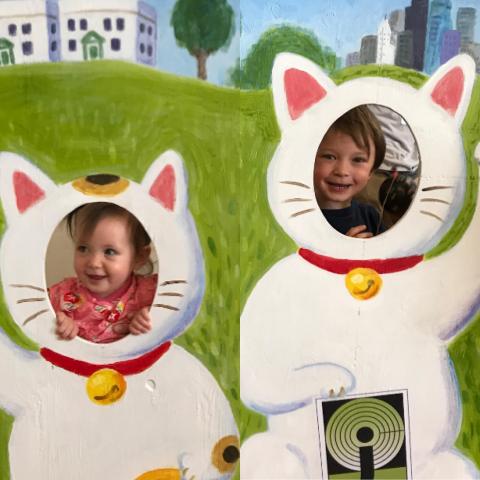
I have a lot of questions as a mom raising biracial children who don’t necessarily look like me. My son is a beautiful mixture of myself and my husband in both personality and appearance. He is a silly, gregarious, and fun-loving bundle of energy like my husband, and also inquisitive, curious, (and I think introverted) ---- like me. And my daughter is fire, fury, and laughter and we are still figuring out which traits came from one parent or another (can anyone relate to that?!). And while in appearance everyone assures me that they both look like a mix of both of us, their complexion is decidedly fair.
I’m half Japanese. My mother is sansei (third-generation) Japanese and my dad is white -- a combination of European heritage. My husband is half Icelandic, an eighth Filipino, and whatever percentage remains is European sherbert. That makes our kids a mixture of backgrounds and cultures.
Growing up biracial, I didn’t -- and still don’t -- identify that way. I identify as Asian American. I understand the complexities of growing up biracial and the constant push and pull between the poles of your racial makeup. I understand the feeling of never quite belonging to either or any group. I wasn’t Japanese enough. I wasn’t white enough. With my friends of color I was “only half” and with my white friends I was either a “twinkie”, “not really white”, or “not really Asian”.
Now raising my own children, I have no idea what their racial identity will be. I just hope I can guide both of them along the way and provide the support they need on their individual journeys of determining what that is for themselves.
I want them to acknowledge and understand their white (and in my son’s case, male) privilege. There is a great responsibility in raising white boys to be kind, tenderhearted, just, and if we are being frank, active in the work of dismantling big systems like white supremacy and misogyny. But I also want them to identify, value, and hold their connection to their Japanese and Filipino roots.
My grandpa spent his formative years in “the camps” during the incarceration of Japanese Americans during World War II -- and I hope they too have a deep and visceral connection to our family’s history -- it has been a source of connection to the ache of marginalized communities and the need for social justice throughout my life. And I hope they can find value and pride in traditions, practices, and language from this side, too. My family’s history and experience has been so critical in the formation of my identify, and I want to hold space for my kids to identify with these roots, too, in a world that forces us into monochromatic categories of experience and identity.
I have all the questions (and none of the answers) about raising a biracial child:
-
How do you teach your biracial child who passes as, and may identify as, white about the privilege they experience while also holding and valuing their very real connection to their roots of color?
-
How do you make space for biracial identity development when their appearance carries the very real the weight of privilege?
While I don’t have all the answers, I’ve tried to focus on simple ways to integrate a biracial identity into our family language and culture, hoping that it serves both as an opportunity for my children to make connections to their ancestry, and to help them better understand and name culture because part of fighting against racism and white supremacy is being able to identify and name (white) culture.
Are you struggling with the same thing? Or do you have any brilliant insight into all of this? I would really welcome your questions and comments!


The views and opinions expressed in this post are those of the author(s) and do not necessarily reflect those of MomsRising.org.
MomsRising.org strongly encourages our readers to post comments in response to blog posts. We value diversity of opinions and perspectives. Our goals for this space are to be educational, thought-provoking, and respectful. So we actively moderate comments and we reserve the right to edit or remove comments that undermine these goals. Thanks!